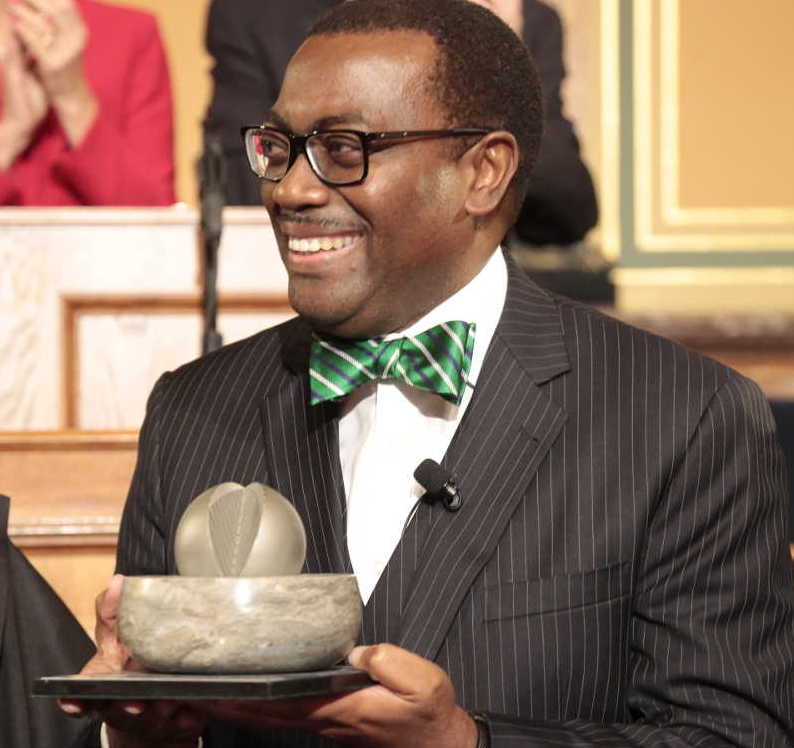His views on land tax, agrarian systems, and choice of production technologies
DES MOINES, United States of America, October 17, 2017/ —
Africa holds the key for feeding the nine billion people that will inhabit this planet by 2050, the President of the African Development Bank and 2017 World Food Prize Laureate, Dr. Akinwumi Adesina, said during his Norman Borlaug Lecture delivered on World Food Day.
The Laureate also called for land tax for unused agricultural land or underutilized agricultural land to provide incentives for faster commercialization of agriculture and unlocking its potential in Africa.
In a lecture titled: “Betting on Africa to Feed the World,” delivered on Monday, October 16 before a large international audience at Iowa State University in Des Moines, Iowa, Adesina stressed why, more than ever before, the world must help Africa to rapidly modernize its agriculture and unlock its full potential.
“Africa sits on 65% of the uncultivated arable land left in the world, so what Africa does with agriculture will determine the future of food in the world,” he emphasized. “African farmers need more than a helping hand. They need a policy lift,” Adesina said.
He also highlighted how the challenge of addressing global food security is greatest in Africa where close to 300 million are malnourished. It is also the only region of the world where the proportion of the population that is food insecure has increased, he said.
The AfDB President paid tribute to Dr. Norman Borlaug, whom the lecture series was named after, and recalled how Africa was the last frontier for the late Borlaug.
Borlaug, the Founder of the World Food Prize, was awarded the Nobel Peace Prize in 1970 for a lifetime of work to feed a hungry world.
Adesina stressed that despite the progress globally in food production (including in Africa, Latin America and Asia), the world still has 700 million people languishing in extreme poverty. This, he added, includes 800 million with chronic hunger, 2 billion people with micronutrient deficiency, and 150 million children under 5 years of age who are suffering from stunting.
He described the challenge of feeding the world as immense, with need for rapid increases in global food, feed and biofuel production to feed a global population of 9 billion people by 2050.
“If Dr. Borlaug alone could feed one billion people, we definitely can feed 800 million people globally and we definitely can feed 300 million Africans. Dr. Borlaug would be disappointed if we couldn’t and with all technologies and innovations, from gene revolution to ICT revolution, at our disposal, we won’t be able to face him and say we didn’t.”
Adesina decried the current situation where Africa spends US $35 billion annually on food imports, describing it as unacceptable. By his estimates, if the current trend continues, Africa is estimated to spend US $110 billion by 2030 on food imports.
“There is therefore absolutely no reason for Africa to be a food-importing region. Africa has huge potential in agriculture, but, as Dr. Borlaug used to say, nobody eats potential!”
Unlocking that potential must start with the savannas of Africa which covers “a mind-boggling 600 million hectares of which 400 million hectares are cultivable,” Adesina said.
Africa’s savannas, he said, are better than the savannas of Brazil, because their soils are not acidic and therefore do not need liming, which had to be done at massive scales in Brazil.
“Yet, while the savannas of Brazil feed the world, those of Africa cannot even feed the farmers there,” he lamented. He further highlighted how technologies, innovations, research and development, mechanization, modernization of agriculture, policy support and massive investments in infrastructure made the difference to turn the savannas of Brazil and those of Northern Thailand into a food powerhouse.
To transform its agriculture, Africa needs to make a decision to develop new agrarian systems ? one that combines smallholder farmers with a new dynamic generation of medium and large commercial farmers.
He also canvassed land tenure systems that make it easier to get access to land, and for smallholder farmers and their communities to have secured land rights.
A top priority must be to mechanize agriculture in Africa, he added.
For more on the World Food Prize/Borlaug Dialogue events, please visit: www.AfDB.org/2017wfp and www.WorldFoodPrize.org.
Article provided by the African Press Organization Group








